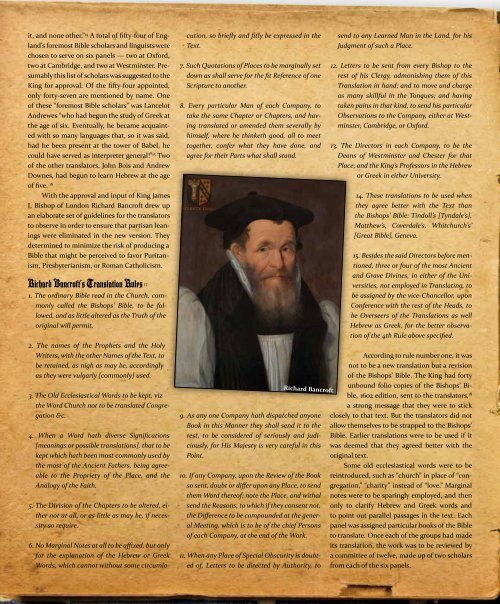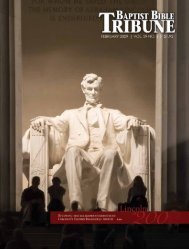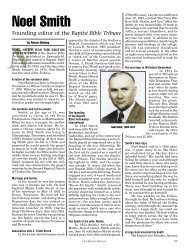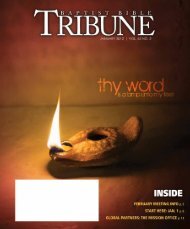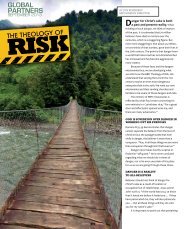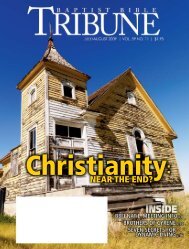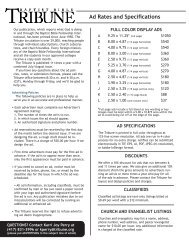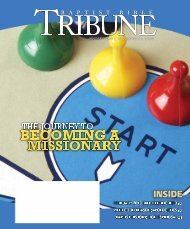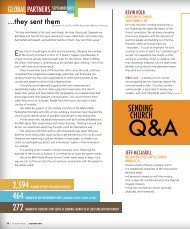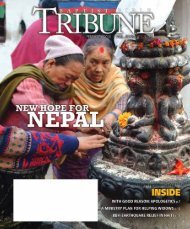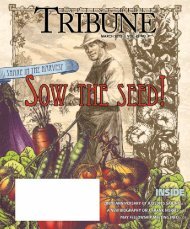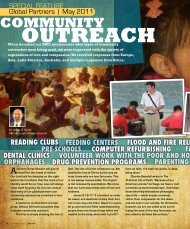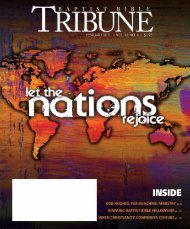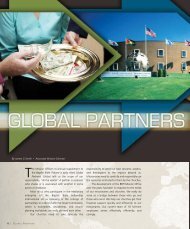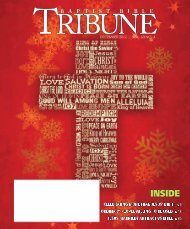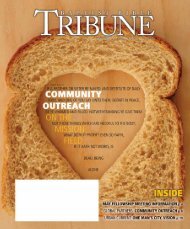O - Baptist Bible Tribune
O - Baptist Bible Tribune
O - Baptist Bible Tribune
Create successful ePaper yourself
Turn your PDF publications into a flip-book with our unique Google optimized e-Paper software.
it, and none other.” 14 A total of fifty-four of England’s<br />
foremost <strong>Bible</strong> scholars and linguists were<br />
chosen to serve on six panels — two at Oxford,<br />
two at Cambridge, and two at Westminster. Presumably<br />
this list of scholars was suggested to the<br />
King for approval. Of the fifty-four appointed,<br />
only forty-seven are mentioned by name. One<br />
of these “foremost <strong>Bible</strong> scholars” was Lancelot<br />
Andrewes “who had begun the study of Greek at<br />
the age of six. Eventually, he became acquainted<br />
with so many languages that, so it was said,<br />
had he been present at the tower of Babel, he<br />
could have served as interpreter general!” 15 Two<br />
of the other translators, John Bois and Andrew<br />
Downes, had begun to learn Hebrew at the age<br />
of five. 16<br />
With the approval and input of King James<br />
I, Bishop of London Richard Bancroft drew up<br />
an elaborate set of guidelines for the translators<br />
to observe in order to ensure that partisan leanings<br />
were eliminated in the new version. They<br />
determined to minimize the risk of producing a<br />
<strong>Bible</strong> that might be perceived to favor Puritanism,<br />
Presbyterianism, or Roman Catholicism.<br />
Richard Bancroft’s Translation Rules 17<br />
1. The ordinary <strong>Bible</strong> read in the Church, commonly<br />
called the Bishops’ <strong>Bible</strong>, to be followed,<br />
and as little altered as the Truth of the<br />
original will permit.<br />
2. The names of the Prophets and the Holy<br />
Writers, with the other Names of the Text, to<br />
be retained, as nigh as may be, accordingly<br />
as they were vulgarly [commonly] used.<br />
3. The Old Ecclesiastical Words to be kept, viz<br />
the Word Church not to be translated Congregation<br />
&c.<br />
4. When a Word hath diverse Significations<br />
[meanings or possible translations], that to be<br />
kept which hath been most commonly used by<br />
the most of the Ancient Fathers, being agreeable<br />
to the Propriety of the Place, and the<br />
Analogy of the Faith.<br />
5. The Division of the Chapters to be altered, either<br />
not at all, or as little as may be, if necessity<br />
so require.<br />
6. No Marginal Notes at all to be affixed, but only<br />
for the explanation of the Hebrew or Greek<br />
Words, which cannot without some circumlocution,<br />
so briefly and fitly be expressed in the<br />
Text.<br />
7. Such Quotations of Places to be marginally set<br />
down as shall serve for the fit Reference of one<br />
Scripture to another.<br />
8. Every particular Man of each Company, to<br />
take the same Chapter or Chapters, and having<br />
translated or amended them severally by<br />
himself, where he thinketh good, all to meet<br />
together, confer what they have done, and<br />
agree for their Parts what shall stand.<br />
9. As any one Company hath dispatched anyone<br />
Book in this Manner they shall send it to the<br />
rest, to be considered of seriously and judiciously,<br />
for His Majesty is very careful in this<br />
Point.<br />
10. If any Company, upon the Review of the Book<br />
so sent, doubt or differ upon any Place, to send<br />
them Word thereof; note the Place, and withal<br />
send the Reasons, to which if they consent not,<br />
the Difference to be compounded at the general<br />
Meeting, which is to be of the chief Persons<br />
of each Company, at the end of the Work.<br />
11. When any Place of Special Obscurity is doubted<br />
of, Letters to be directed by Authority, to<br />
send to any Learned Man in the Land, for his<br />
Judgment of such a Place.<br />
12. Letters to be sent from every Bishop to the<br />
rest of his Clergy, admonishing them of this<br />
Translation in hand; and to move and charge<br />
as many skillful in the Tongues; and having<br />
taken pains in that kind, to send his particular<br />
Observations to the Company, either at Westminster,<br />
Cambridge, or Oxford.<br />
13. The Directors in each Company, to be the<br />
Deans of Westminster and Chester for that<br />
Place; and the King’s Professors in the Hebrew<br />
or Greek in either University.<br />
14. These translations to be used when<br />
they agree better with the Text than<br />
the Bishops’ <strong>Bible</strong>: Tindoll’s [Tyndale’s],<br />
Matthew’s, Coverdale’s, Whitchurch’s’<br />
[Great <strong>Bible</strong>], Geneva.<br />
15. Besides the said Directors before mentioned,<br />
three or four of the most Ancient<br />
and Grave Divines, in either of the Universities,<br />
not employed in Translating, to<br />
be assigned by the vice-Chancellor, upon<br />
Conference with the rest of the Heads, to<br />
be Overseers of the Translations as well<br />
Hebrew as Greek, for the better observation<br />
of the 4th Rule above specified.<br />
According to rule number one, it was<br />
not to be a new translation but a revision<br />
of the Bishops’ <strong>Bible</strong>. The King had forty<br />
unbound folio copies of the Bishops’ <strong>Bible</strong>,<br />
1602 edition, sent to the translators, 18<br />
a strong message that they were to stick<br />
closely to that text. But the translators did not<br />
allow themselves to be strapped to the Bishops’<br />
<strong>Bible</strong>. Earlier translations were to be used if it<br />
was deemed that they agreed better with the<br />
original text.<br />
Some old ecclesiastical words were to be<br />
reintroduced, such as “church” in place of “congregation,”<br />
“charity” instead of “love.” Marginal<br />
notes were to be sparingly employed, and then<br />
only to clarify Hebrew and Greek words and<br />
to point out parallel passages in the text. Each<br />
panel was assigned particular books of the <strong>Bible</strong><br />
to translate. Once each of the groups had made<br />
its translation, the work was to be reviewed by<br />
a committee of twelve, made up of two scholars<br />
from each of the six panels.<br />
10 | <strong>Baptist</strong> <strong>Bible</strong> <strong>Tribune</strong> | March 2011


